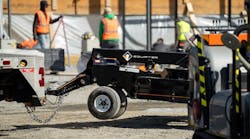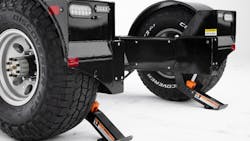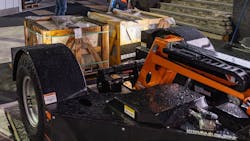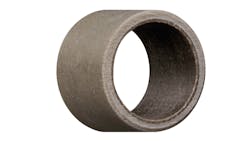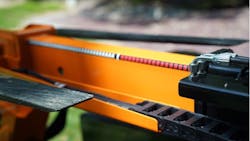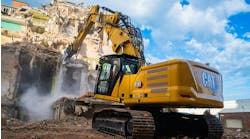Composite Bearing Takes All-Terrain Forklift to New Heights
In this application story from igus, the company offers a look at how its composite bearings met the performance and maintenance-free requirements of a new forklift design.
With the simple pivot of a joystick, a contractor — standing several feet away — maneuvers an all-terrain forklift to a tall pile of lumber. He activates its robust lifting mechanism, raising the boom 8 ft. into the air, and then drives the machine so that its forks slide easily under a stack of wooden boards for transport across the job site. The contractor continues on in this way, maneuvering the forklift, and its hundreds of pounds of materials, across the yard. When the day is done, the machine folds up, and the contractor hitches it to the back of his pickup truck and drives away.
This remote controlled, towable forklift is called the Equipter Tow-A-Lift, and it combines all the essential capabilities of an all-terrain forklift, pallet jack, piggyback forklift and telehandler. This machine can pick up and move up to 3,500 lbs. over uneven terrain with minimal ground disruption, expanding its use cases to residential properties and commercial venues where the landscaping must be preserved.
New Heights, LLC, a Lancaster, PA-based company, is the manufacturer behind the Tow-A-Lift and other Equipter products, which include drivable dumpsters, towable boom handlers and mobile cranes — all of which were developed to help construction companies, contractors, roofers and other end users “work smarter, not harder.”
Yet versatile machines like the Tow-A-Lift are only as good as their mechanical components, which must be able to handle high loads, weather, exposure to dust and other demanding conditions. If one component fails, then all the benefits of the Tow-A-Lift, including greater efficiency, time savings and productivity on job sites, become immaterial.
The bearing is one such component.
The Transition to Greaseless Bearings
According to Benjamin Barrall, Senior Engineer at New Heights, an important goal for the Equipter Tow-A-Lift was to make it as maintenance-free as possible. This meant finding a rugged bearing for the machine’s numerous pivot points.
“We wanted to eliminate the need for end users to have to grease the pivot points, creating a totally maintenance-free solution,” Barrall said. Further strengthening this decision is the fact that equipment rentals make up a large portion of New Heights’s business. “Ultimately, we wanted to design machines for end users who didn’t necessarily have a lot of mechanical expertise. This meant providing them with a ‘set it and forget it’ machine solution that would operate as expected without fail.”
This requirement to design a rugged, maintenance-free machine precluded the use of metal bearings, which would require ongoing lubrication to reduce friction and minimize wear. In this scenario, if any of the pivot points in the Tow-A-Lift become dry, the bearing would rust, necessitating costly replacement of the shaft, the housing and the bearing itself.
A Maintenance-Free Composite Bearing Solution
New Heights was already beginning to transition to polymer bearings. “Depending on the pivot point, our machines had either steel bearings with a grease fitting, or a polymer bearing,” said Josiah Harthcock, Engineering Manager, Equipter. “In the locations where we used polymer bearings, we’ve seen success with the overall longevity of the pivot, along with very little maintenance associated with it.”
For the newer Tow-A-Lift machine, which New Heights has only recently begun to roll out, its engineers needed to identify dry-running polymer bearings that could stand up to the harsh conditions associated with construction sites for a wider range of pivot diameter and widths than their existing models. The requirements included:
- high load capacity,
- exposure to dirt and debris,
- a wide ambient temperature range,
- potential exposure to hydraulic fluids, gasoline and other chemicals.
Meeting these requirements is the igus TX1 composite bearing, which New Heights selected for eight of the pivot points on its Tow-A-Lift, specifically those on the hitch and front outriggers. Developed for very high loads, these bearings combine different materials, such as woven mineral materials, that are combined with synthetic resins and additives, all of which are pressed under high temperatures and pressure.
Getting the Job Done With the Right Material Technologies
In addition to the performance of the bearing itself, New Heights engineers were pleased with the experience of working and building their relationship with igus to specify the right bearing for the Tow-A-Lift. Prior to the Tow-A-Lift, New Heights exclusively used polymer bearings from an igus competitor.
“Throughout the process, we’ve been very pleased with how easy it was to connect with igus experts, receive product samples and access all the technical information,” Barrall said.
Among the technical specifications igus provides for its products is the testing data. The company optimizes its self-lubricating plastics from a tribology standpoint, ensuring each polymer blend includes base materials to resist wear and endure high forces without any external oil or grease. igus verifies the material performance through extensive in-house testing, ensuring the polymer lasts longer and performs better than metal.
“Nowadays, companies don’t always have the time and resources to allot to extra maintenance and downtime,” said an igus sales rep. “That’s why we prioritize finding material technologies that can increase the service life of the equipment and decrease the amount of hands that touch it. That’s what composite products like the TX1 bearing do.”
“We’ve only just started rolling out the Tow-A-Lift, but we’re optimistic that the igus bearing will play a big role in maximizing uptime and reducing the number of service calls for the machine,” Barrall added. “We look forward to continuing our partnership with igus to incorporate its composite bearings into more Equipter machines.”
This article was written and contributed by Shannon Douglas, Regional Sales Manager, Mid-Atlantic Region, igus Inc.
